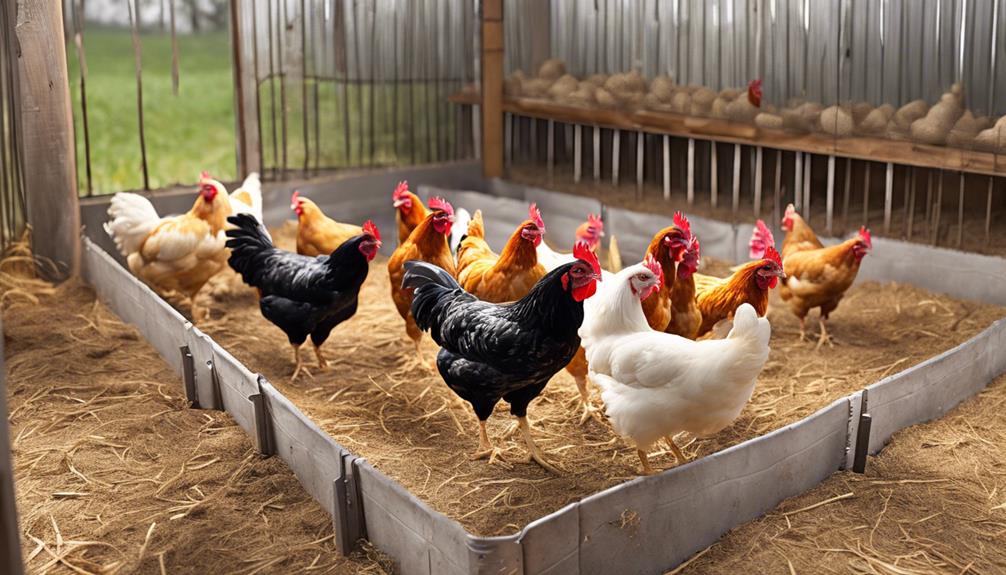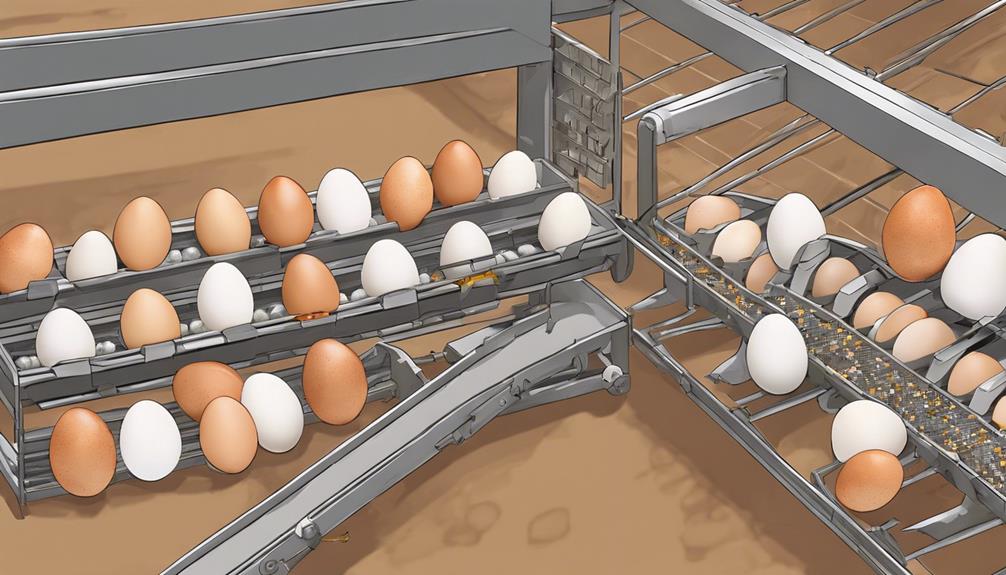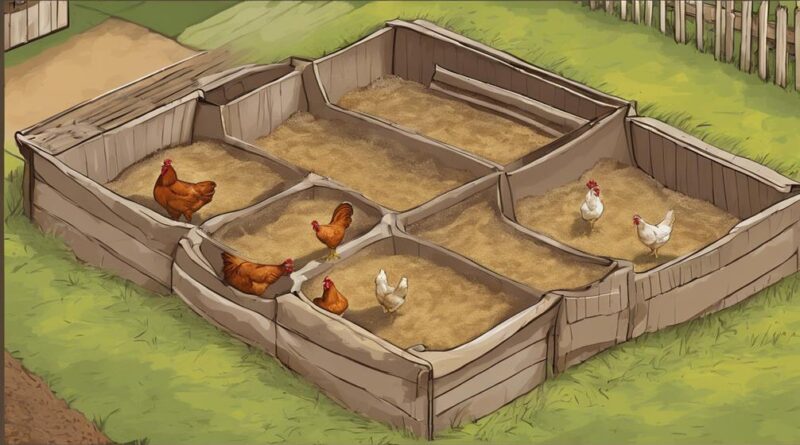Top 10 Effective Techniques for Chicken Farming"
When it comes to successful chicken farming, mastering the top 10 effective techniques is paramount. From selecting the ideal breeds to implementing stringent biosecurity measures, each step plays a crucial role in the overall operation. But what truly sets apart a thriving chicken farm? Stay tuned as we uncover the lesser-known techniques that can elevate your poultry farming endeavors and ensure a sustainable and prosperous future for your feathered friends.
Selecting the Right Chicken Breeds
When beginning your journey into effective chicken farming, selecting the right chicken breeds is a critical first step in ensuring success and productivity. Breeding selection plays a crucial role in determining the overall health, growth rate, egg production, and adaptability of your flock. It's essential to research different breeds thoroughly, considering factors such as climate compatibility, egg-laying capacity, resistance to common diseases, and the purpose of your farm (meat production, egg production, dual-purpose, etc.).
Conducting thorough health monitoring is another vital aspect of selecting the right chicken breeds. Before introducing new breeds to your existing flock, it's crucial to ensure they're free from parasites, diseases, or genetic disorders that could potentially harm your entire flock. Regular health check-ups, observation of behavior, and consultation with a veterinarian can help you make informed decisions regarding the health status of your chickens.
When selecting chicken breeds, consider breeds known for their resilience, adaptability to your specific climate, and overall suitability for your farming goals. For example, if you're in a cold climate, breeds like Rhode Island Reds or Orpingtons are known for their cold hardiness. On the other hand, if you aim for high egg production, breeds like Leghorns or Australorps might be more suitable. By carefully evaluating breeding selection and health monitoring practices, you can set a strong foundation for a successful and thriving chicken farming venture.
Providing Proper Nutrition
To optimize the health and productivity of your chicken flock, it's paramount to carefully craft a nutrition plan tailored to meet their specific dietary needs and support their growth and egg-laying capabilities efficiently. Proper nutrition plays a crucial role in ensuring that your chickens remain healthy and productive.
Here are three essential aspects to consider when providing proper nutrition for your chickens:
- Feeding Schedules and Dietary Requirements: Establishing a consistent feeding schedule is vital for chickens to receive the necessary nutrients at the right times. Different stages of growth and production require specific dietary requirements. For example, chicks need a starter feed high in protein, while laying hens benefit from calcium-rich diets to support eggshell formation.
- Nutrient Supplementation and Health Benefits: In addition to their regular feed, chickens may require nutrient supplementation to ensure they receive all essential vitamins and minerals. Supplements like oyster shells for calcium or grit for digestion can enhance their overall health and well-being. Providing these supplements can lead to improved egg quality, stronger immunity, and better growth rates.
- Monitoring and Adjusting: Regularly monitor your chickens' health and performance to assess if their current diet is meeting their needs. Adjustments may be necessary based on factors like seasonal changes, fluctuations in egg production, or individual health issues. Consulting with a poultry nutrition expert can help tailor a nutrition plan specific to your flock's requirements, ensuring optimal health and productivity.
Ensuring Adequate Space and Housing
Ensuring adequate space and housing for your chickens is essential to promote their well-being and maximize their overall productivity on the farm. When it comes to coop design, consider a well-ventilated structure that allows for proper airflow. Adequate ventilation helps prevent the buildup of harmful gases like ammonia, which can negatively impact the health of your chickens. Additionally, proper ventilation regulates temperature and moisture levels, creating a comfortable environment for your flock.
Space utilization is another crucial aspect to focus on. Providing enough space per chicken is vital to prevent overcrowding, which can lead to stress and aggressive behavior. Aim for at least 2-4 square feet of space per bird inside the coop and 8-10 square feet per bird in the outdoor area. This ensures that your chickens have enough room to move around freely and exhibit natural behaviors.
When it comes to lighting, natural light is ideal for chickens as it helps regulate their circadian rhythm. If natural light is limited, consider supplementing with artificial lighting to ensure a consistent day-night cycle. Proper lighting not only supports egg production but also helps maintain the overall health and well-being of your chickens. By paying attention to coop design, ventilation, space utilization, and lighting, you can create a conducive environment for your chickens to thrive.
Implementing Biosecurity Measures
Implementing a stringent biosecurity protocol is crucial for safeguarding your chicken farm and ensuring the health and productivity of your flock. By following effective biosecurity measures, you can significantly reduce the risk of disease outbreaks and maintain a healthy environment for your chickens.
Here are three key strategies to enhance biosecurity on your farm:
- Controlled Access: Limit access to your farm to essential personnel only. Visitors, vehicles, and equipment coming onto the farm can introduce diseases. Implement a designated entry point where all individuals must follow biosecurity procedures such as disinfecting footwear and washing hands before entering.
- Quarantine Procedures: Introduce new birds to your flock with caution. Quarantine new birds in a separate area for at least 30 days to monitor for any signs of disease. This isolation period helps prevent the spread of potential infections to your existing flock.
- Sanitation Practices: Maintain strict cleanliness standards within your farm. Regularly clean and disinfect equipment, housing facilities, and common areas. Proper waste management and removal of litter can help reduce the presence of disease-causing agents in the environment.
Adhering to these biosecurity protocols and disease control strategies is crucial for the overall health and well-being of your chickens, ultimately contributing to the success of your poultry farming venture.
Maintaining Cleanliness and Hygiene
Maintain a high standard of cleanliness and hygiene practices to ensure the health and well-being of your chicken flock. Effective waste management is crucial on a chicken farm to prevent the spread of diseases and parasites. Regularly remove and dispose of manure, soiled bedding, and uneaten feed to minimize the risk of contamination. Implementing proper sanitation practices is key to reducing bacteria buildup in the chicken coop. Clean and disinfect waterers, feeders, and nesting areas regularly to create a healthy environment for your chickens.
To manage waste effectively, consider composting as a sustainable solution. Composting not only helps in waste disposal but also produces nutrient-rich fertilizer for your farm. Additionally, maintaining a dry environment by providing adequate bedding and proper ventilation can aid in waste management by preventing moisture buildup that attracts harmful pathogens.
Sanitation practices should extend beyond just cleaning the physical space. Implement biosecurity measures such as limiting visitors to your farm, using foot baths, and changing into farm-specific clothing and boots before entering the coop. These measures help prevent the introduction of diseases to your flock, ensuring a healthier environment for your chickens.
Regularly monitoring the cleanliness of your farm, implementing waste management strategies, and following strict sanitation practices are essential steps in maintaining the health and hygiene of your chicken flock. By prioritizing cleanliness, you're proactively safeguarding your chickens against potential health hazards and promoting their overall well-being.
Monitoring Health and Welfare
Prioritizing regular health assessments and welfare checks is essential for ensuring the longevity and productivity of your chicken flock. By staying vigilant and proactive in monitoring the health and welfare of your chickens, you can prevent potential issues from escalating and maintain a thriving flock.
Here are key aspects to consider:
- Disease Detection: Implement a robust disease detection system by regularly observing your chickens for any signs of illness such as abnormal behavior, reduced egg production, respiratory issues, or unusual physical symptoms. Conduct routine health checks and consult with a veterinarian if you notice any concerning symptoms. Early detection is crucial in preventing the spread of diseases within your flock.
- Welfare Assessment: Conduct regular welfare assessments to ensure that your chickens are living in optimal conditions. Evaluate factors such as housing quality, space availability, access to clean water and balanced nutrition, and overall flock behavior. Make adjustments as needed to promote the well-being of your chickens and create a stress-free environment.
- Record Keeping: Maintain detailed records of health assessments, treatments, vaccinations, and any observed behavioral changes. Keeping accurate records will help you track the health history of individual chickens, identify trends, and make informed decisions regarding their care. This data can also be valuable when seeking advice from poultry experts or veterinarians.
Managing Chicken Behavior

Regularly observing and understanding your chickens' behavior is key to effectively managing their well-being and productivity on your farm. Training methods play a crucial role in shaping your chickens' behavior. Positive reinforcement techniques, such as rewarding desired behaviors with treats, can be highly effective. Consistency in training and patience are essential for successful behavioral modification.
Behavioral issues can arise within a flock, impacting productivity and the overall well-being of your chickens. Identifying and addressing these issues promptly is vital. Common behavioral problems include aggression, feather pecking, and cannibalism. Implementing environmental enrichments, such as providing toys or perches, can help reduce these negative behaviors.
Stress management is another critical aspect of managing chicken behavior. High-stress levels can lead to reduced egg production, poor growth rates, and increased susceptibility to diseases. Ensuring a calm and secure environment, maintaining a consistent routine, and minimizing sudden changes can help alleviate stress in your flock.
Understanding flock dynamics is essential for effective behavior management. Chickens have a hierarchical social structure, with dominant individuals asserting their authority over others. Providing adequate space, food, and resources can help prevent aggression and maintain harmony within the flock.
Implementing Sustainable Practices
To ensure the long-term sustainability of your chicken farming operations, consider integrating environmentally friendly practices into your daily routines. By implementing sustainable practices, you can effectively manage waste, reduce environmental impact, conserve resources, and even save on costs.
Here are three key techniques to help you achieve these goals:
- Effective Waste Management: Proper waste management is crucial for sustainable chicken farming. Implement composting systems for chicken manure to create organic fertilizer for your crops. This not only reduces waste but also provides a cost-effective solution for soil enrichment. Additionally, consider installing a biogas system to convert chicken waste into energy, further minimizing environmental impact and lowering operational costs.
- Resource Conservation: Adopt practices that focus on conserving resources such as water and feed. Install water-efficient systems like drip irrigation to minimize water usage in crop production. Furthermore, implement precision feeding techniques to ensure chickens receive the necessary nutrients without excess feed wastage. These strategies not only benefit the environment but also lead to significant cost savings in the long run.
- Cost Savings through Energy Efficiency: Enhance energy efficiency on your farm by utilizing renewable energy sources like solar panels. Solar energy can power lighting, heating, and ventilation systems, reducing reliance on non-renewable resources and lowering electricity bills. Investing in energy-efficient equipment and practices not only promotes sustainability but also contributes to overall cost savings.
Efficient Egg Collection Strategies

Efficiency in egg collection is a fundamental aspect of optimizing productivity and ensuring the freshness of your poultry products. To achieve this, implementing proper egg grading techniques is crucial. Sort eggs based on size, quality, and weight to meet market standards and consumer expectations. Additionally, utilizing appropriate storage methods such as refrigeration can help maintain egg quality and extend their shelf life.
Maximizing egg production can also be achieved through strategic measures like adjusting lighting schedules and diet. Providing sufficient light to mimic natural daylight can stimulate hens to lay more eggs. Consider using timers to regulate lighting periods effectively. Moreover, ensuring a balanced and nutritious diet for your chickens is essential for consistent egg production. Consult with a poultry nutritionist to tailor a diet that meets the specific needs of your flock.
When collecting eggs, handle them with care to prevent cracks or damage. Use clean, sanitized containers to store the eggs promptly after collection. Remember to label the eggs with the collection date for proper rotation and inventory management. By adhering to these efficient egg collection strategies, you can enhance productivity, maintain egg quality, and ultimately, meet the demands of your market.
Effective Disease Prevention
To maintain the health and biosecurity of your poultry flock, implementing effective disease prevention protocols is paramount. Proper disease prevention not only ensures the well-being of your chickens but also safeguards your farm's productivity and profitability.
Here are three essential strategies for effective disease prevention:
- Vaccination Schedules: Establishing a robust vaccination program is crucial for disease control. Consult with a poultry veterinarian to create a customized vaccination schedule based on the prevalent diseases in your region and the specific needs of your flock. Regular vaccinations significantly reduce the risk of infectious diseases spreading among your chickens.
- Pest Management: Implementing rigorous pest management practices is a key component of disease prevention. Pests like mites, flies, and rodents can introduce and spread diseases within your flock. Regularly inspect and treat your chicken coop for pests, keep the area clean and free of standing water, and consider using pest-resistant building materials to minimize infestations.
- Biosecurity Protocols: Develop and enforce strict biosecurity protocols on your farm to prevent the introduction and spread of diseases. This includes controlling access to your farm, disinfecting equipment and vehicles, and limiting visitors to essential personnel only. By practicing good biosecurity measures, you can significantly reduce the risk of disease outbreaks among your chickens.
Frequently Asked Questions
How Can I Prevent Chickens From Pecking Each Other?
To prevent chickens from pecking each other, focus on behavior modification strategies and understanding the pecking order dynamics. Implement environmental enrichment practices and distraction techniques to keep them engaged and reduce aggression.
Providing ample space, varied feed options, and objects for pecking can help alleviate boredom and minimize pecking incidents. By creating a stimulating and harmonious environment, you can effectively manage chicken behavior and promote peaceful coexistence within the flock.
What Is the Best Way to Introduce New Chickens to the Flock?
When adding new chickens to your flock, it's important to consider the existing dynamics. Start by isolating the new birds within sight of the others to allow for gradual acclimation.
After a week, introduce them during daylight hours, closely monitoring interactions. Provide multiple food and water sources to reduce competition.
Keep an eye on the pecking order and intervene if necessary to ensure a smooth integration process for a harmonious flock.
How Often Should I Clean and Replace Bedding in the Coop?
You should clean and replace bedding in the coop regularly to maintain cleanliness and keep your chickens healthy. Bedding maintenance is crucial for coop hygiene.
It's recommended to clean the coop and replace bedding at least once a week, but this frequency may vary based on the number of chickens and the coop size.
Regularly removing soiled bedding helps prevent diseases, odors, and pests, ensuring a comfortable environment for your flock.
Can I Use Natural Remedies for Common Chicken Ailments?
When it comes to addressing common chicken ailments, you can certainly utilize herbal remedies and holistic treatments. Natural solutions like homemade recipes can be effective in treating various issues your flock may face.
From respiratory problems to parasites, there are plenty of options to explore that can help keep your chickens healthy and thriving. Researching different herbal remedies and incorporating them into your care routine can be a proactive approach to poultry health.
How Do I Protect My Chickens From Predators at Night?
To protect your chickens from predators at night, focus on nighttime security and predator prevention. Understanding your chickens' roosting habits is crucial. Ensure your coop has sturdy construction and secure locks.
Install motion-sensor lights or alarms to deter predators. Consider adding a perimeter fence or using electric fencing for added protection. Regularly inspect your coop for any vulnerabilities that could compromise the safety of your flock.
Conclusion
In conclusion, mastering the top 10 effective techniques for chicken farming is essential for achieving optimal productivity and success in your operation.
By carefully selecting the right breeds, providing proper nutrition, ensuring adequate housing, implementing biosecurity measures, and maintaining cleanliness, you can create a healthy and thriving environment for your chickens.
By incorporating sustainable practices, efficient egg collection strategies, and effective disease prevention measures, you can elevate your chicken farming to new levels of success and efficiency.
